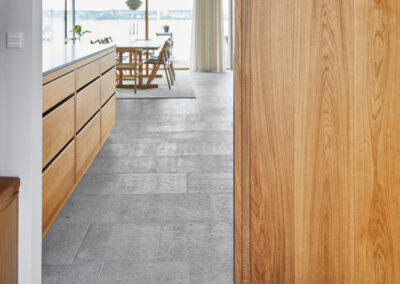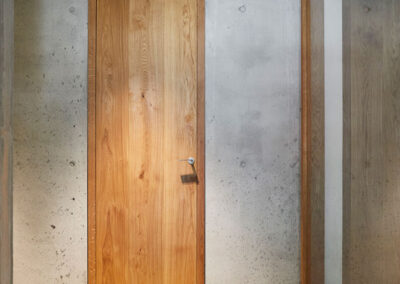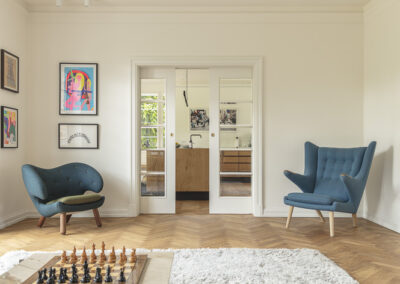Sliding doors
Minimalist and space-saving high-quality interior sliding doors
Sliding doors can act as room dividers without taking up floor space. They can be made to almost disappear into the room, or conversely, they can be made to be a design element in their own right.
Naturally, sliding doors can be integrated into the architecture according to functionality and design requirements.
Two different sliding door systems
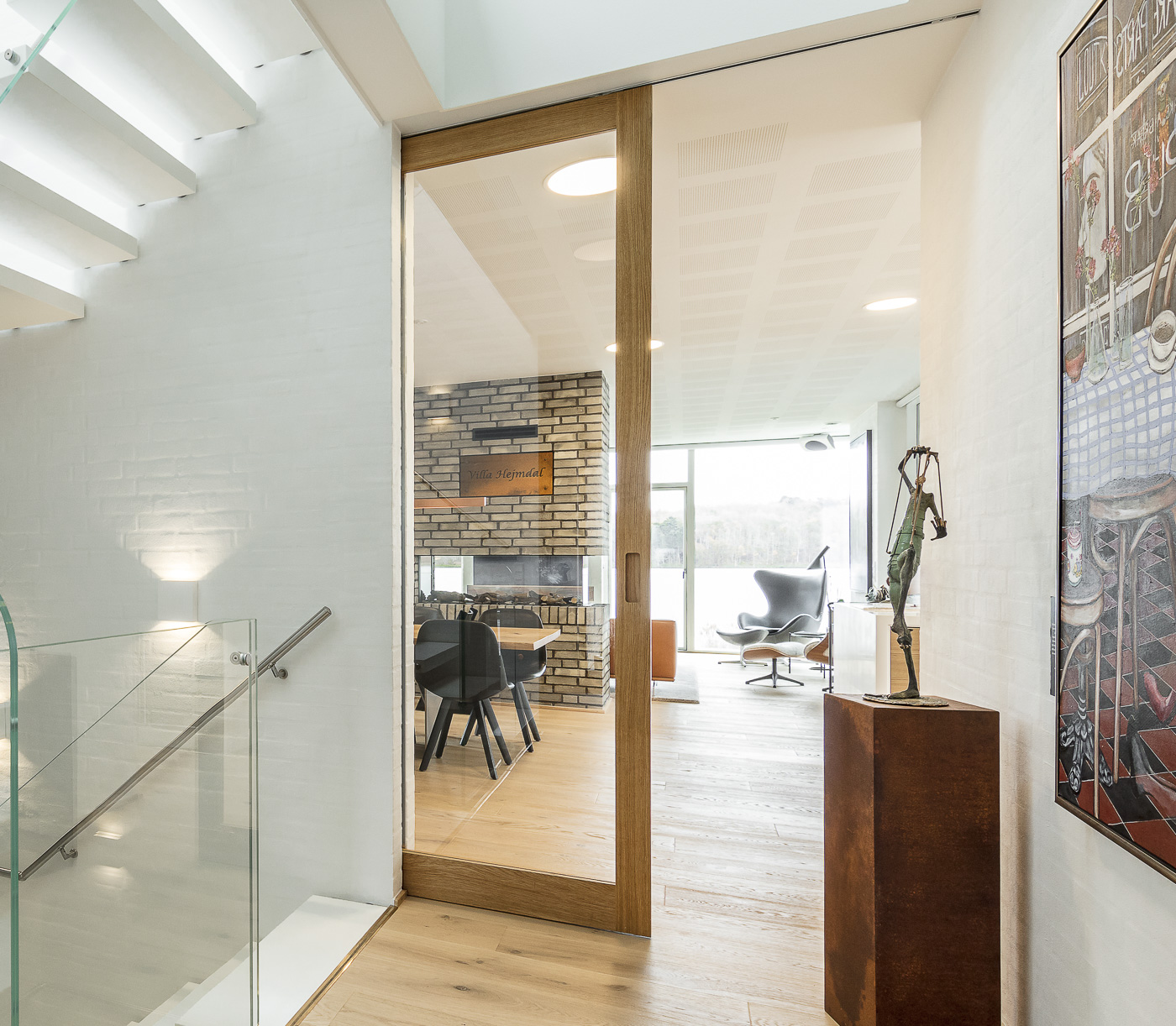
Sliding doors – inside the wall
Built-in sliding doors disappear discreetly when not in use. When pulled out from the wall, they appear more like mobile walls than regular doors.
This solution is ideal when there is space for the door leaf inside the wall,
Sliding doors – on the wall
A door that hangs on the wall is ideal if you want a more contrasting solution or if there is no room for the door leaf inside the wall.
Depending on the design of the sliding door, the door leaf can become a striking design element by choosing a distinctive wood species or other surface, or be discreet by choosing a surface that matches the wall and possibly has glass infills.
Sliding wooden doors become part of the interior
In today’s modern design world, the use of wood in interior design has become an essential element that not only brings warmth and natural beauty into our homes, but also fits in perfectly with the dominant trends of the time. Wood has become more than just a building material; it has become a statement of sustainability, aesthetics and connection to nature.
That’s why we see many examples of wood being used as the mainstay of interior architecture, and doors becomes an integral part of the architecture.
In this beautiful, modern villa, wood is a key and dominant interior design element. To divide the large kitchen-dining area from the hallway, a sliding door with oak veneer was chosen to blend in with both the kitchen and the cabinetry in the hallway.
Architect: Verna
Photo: Studio Stine Albertsen
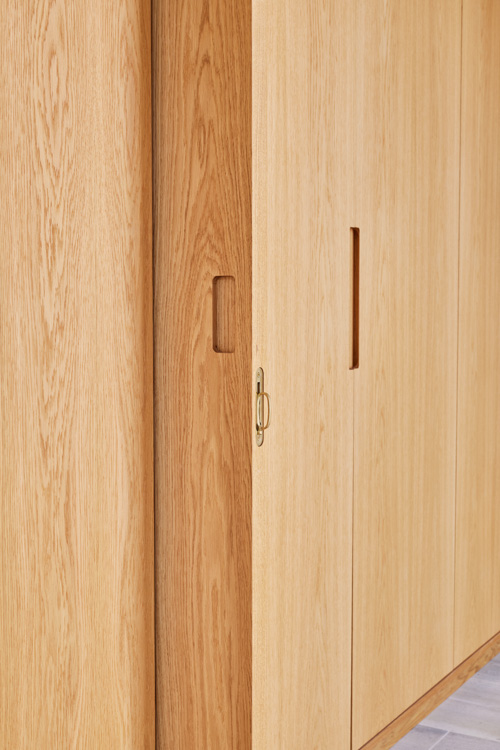
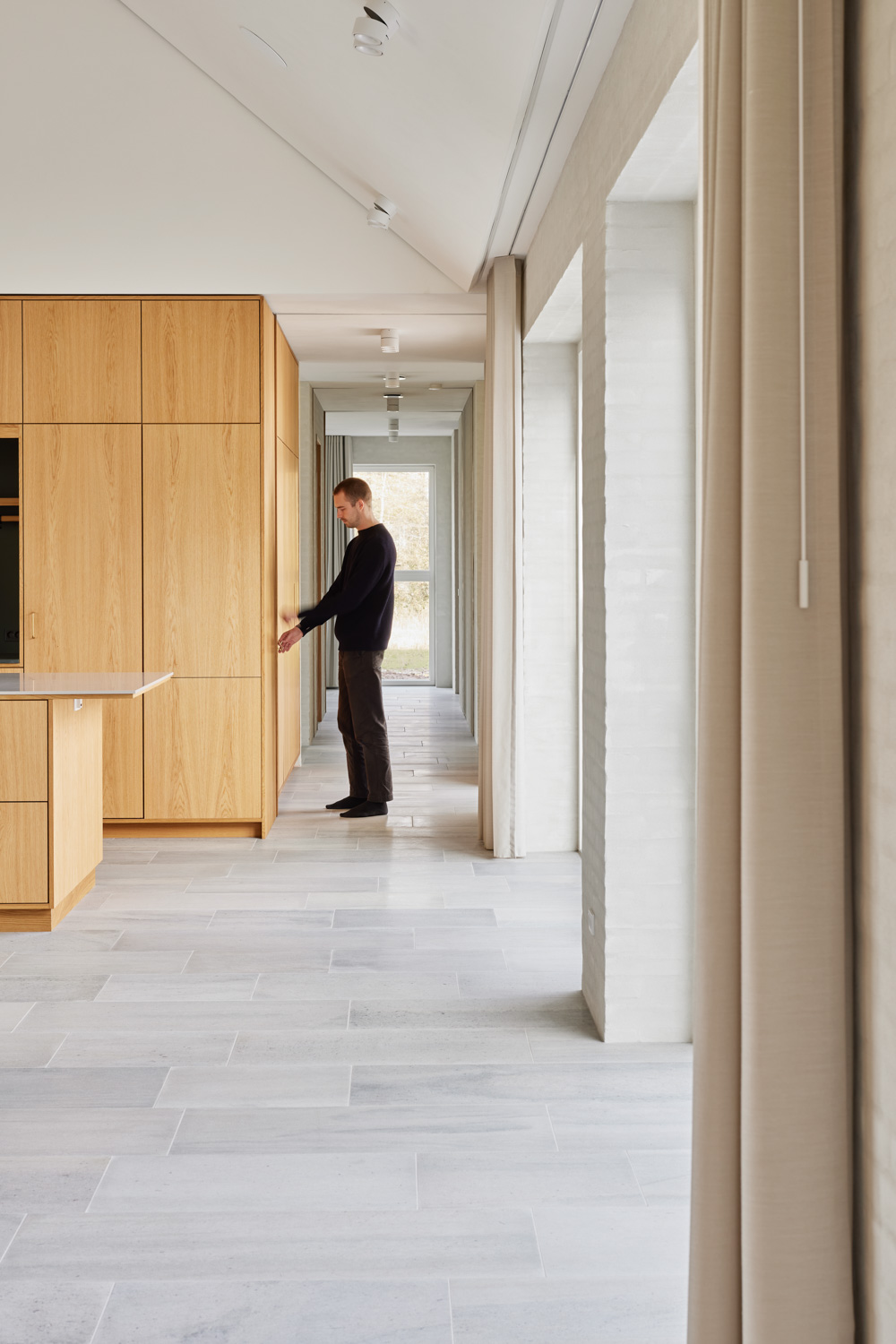
Sliding door in oak veneer blends harmoniously with the rest of the oak interior.

Two large sliding doors cover both a bar and a small office.
Decorate with sliding doors
A sliding door is a perfect element of interior design. Depending on the design you choose, you can achieve many different style expressions. A painted sliding door that matches the color of the wall can make the wall and door blend into one. A sliding door in natural materials can create a warm contrast in the room.
In this villa, the sliding doors have a very special function. When closed, they form the backdrop for a walkway. When they are open, the functionality of the house changes completely. Behind one sliding door you’ll find a bar. Behind the second sliding door is a small office.
Benefits of sliding doors
Space saving
A sliding door doesn’t take up floor space as it doesn’t have to swing into the room.
Smooth transition
A sliding door provides a smooth transition between rooms.
For small spaces
A sliding door provides more floor space in small rooms and hallways.
Soft Close
Experience the same comfortable comfort you know from kitchen drawers.
Sliding doors adapted to the room
By customizing the sliding door to the dimensions of your home or building, you can make the most of small rooms and hallways that may otherwise be difficult to utilize.
In small rooms, there is often no room for a door that takes up floor space when opened. Sliding doors can often be the answer to a door solution if there is wall space for it.
In rooms where there is a small door gap or a sloping door gap, a sliding door can change the visual appearance by making the door larger than the door gap. In this villa, where the doors are a key design element, the sliding door is the same height as the other doors in the house, although the doorway is significantly smaller in the bathroom. This creates an aesthetic coherence in the architecture.

Sliding door in dark oak. The door is built higher than the doorway, making the room appear taller.
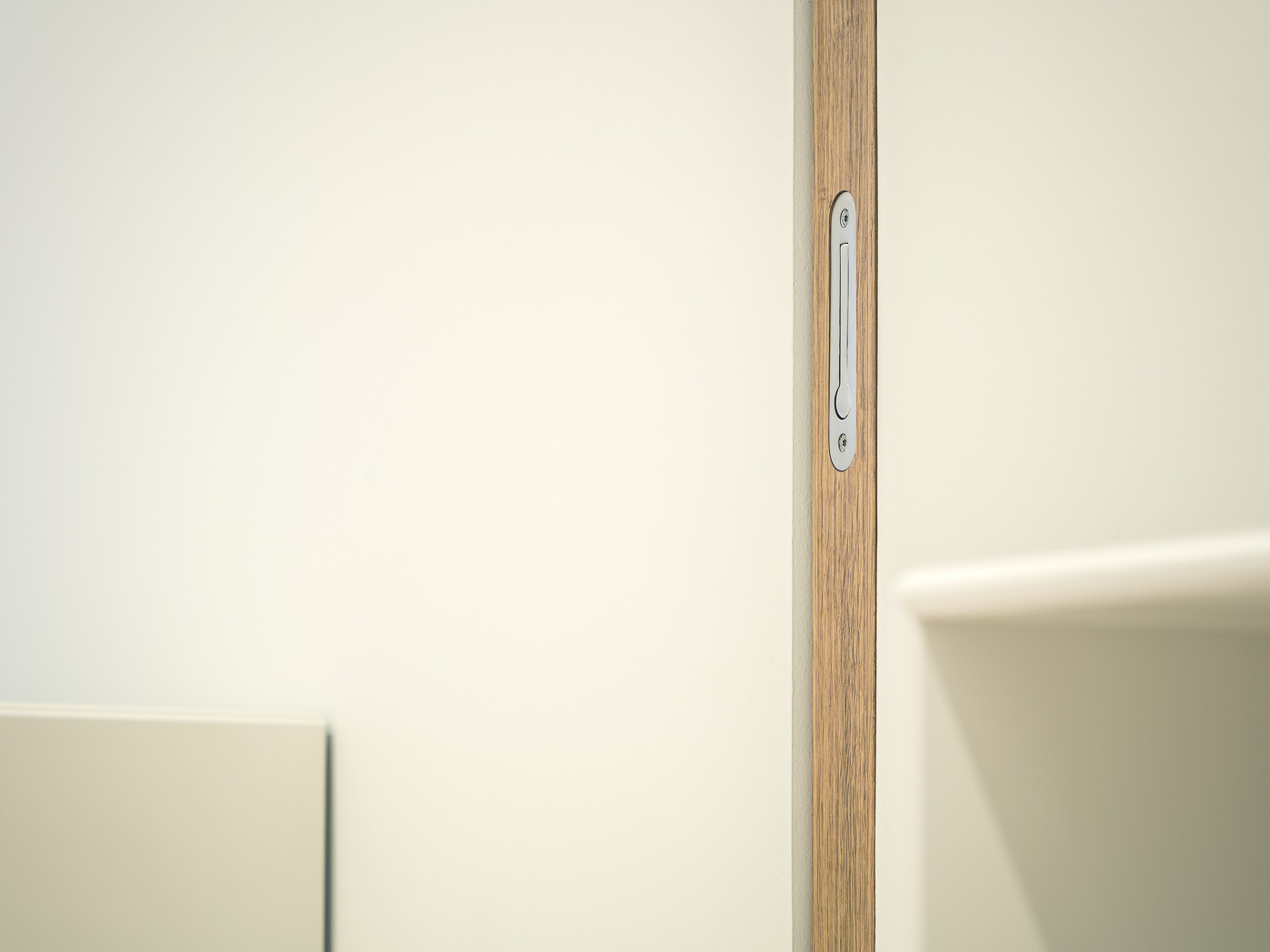
In this villa, a sliding door that disappears into the wall was chosen. The door is made of wood, which gives a simple aesthetic impression to the white surfaces.
Made-to-measure sliding doors
When investing in a new sliding door, it’s always a good idea to get an overview of the options available. If you’re looking for a floor-to-ceiling solution that either screens off open shelving and wardrobes or is a space-saving door solution, we offer modern sliding doors made to measure to match the rest of your interior design.
Sliding doors with many finish options
When choosing the design of your new sliding door, you basically need to decide whether you want the door to blend harmoniously with the wall and the room, or whether you want it to be designed as a stand-alone interior element.
Whatever the choice, with a Vahle Sliding Door you have many options to choose a surface on the door that either highlights or hides the door.
Typical and classic surface solutions are solid wood, painted wood, glass or veneered wood. But we can also build a sliding door with other types of surfaces, such as metal, linoleum or something completely different.
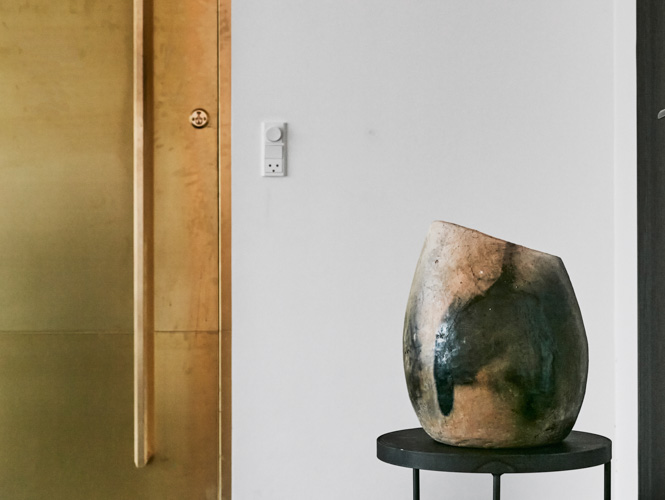
This door has been given a brass finish. Here it is designed as a pivot door, but it could also have been a sliding door.
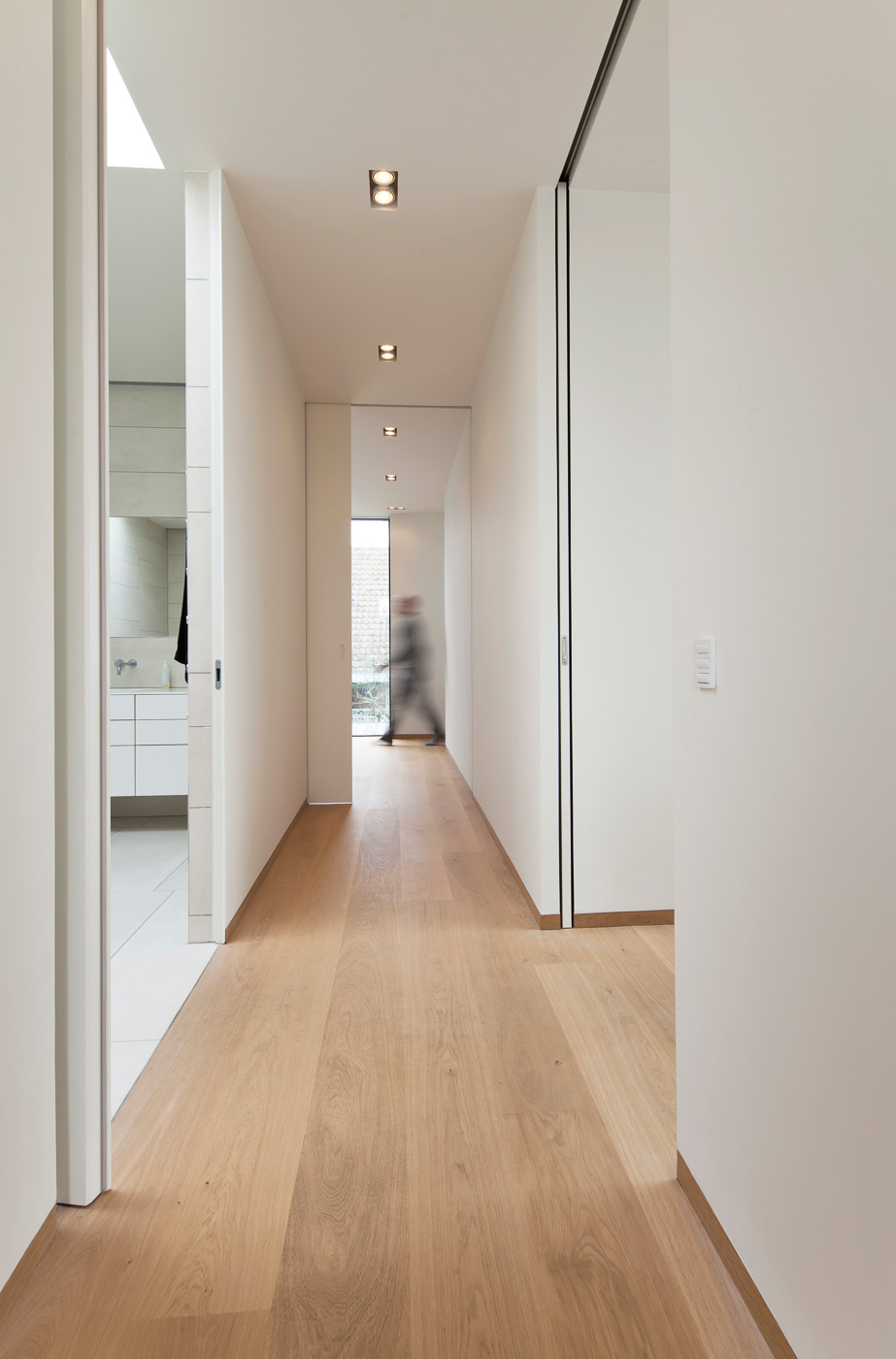
This sliding door has Soft Close, which provides a smooth opening and closing. Sliding doors are also available with Magic Close.
Large sliding doors
Large sliding doors are suitable for modern architecture with high ceilings. We can make sliding doors that go from floor to ceiling, so the sliding door can function as a mobile wall. A floor-to-ceiling sliding door solution is an aesthetic choice that ensures a continuous line in the architecture.
Two rail systems, each with its own locking mechanism
Our sliding doors are available with two different track systems:
- Soft Close: This is where the door closes itself the last 10 cm, giving you the soft and gentle opening and closing you might expect from high-end kitchen solutions. This solution can be used whether the sliding door is wall or in-wall mounted.
- Magic Close: In this system, the sliding door track is hidden whether the door is open or closed. The built-in damper ensures smooth opening and closing here too. This solution can only be used when the sliding door is mounted on the wall.
Indoor sliding doors in well-functioning Danish design
The Danish design philosophy is founded on the idea of functionalism. That’s why the sliding door is the epitome of Danish architectural heritage, as it represents the perfect interplay between form and function. There’s nothing left over or in the way when the door is not in use – and it’s always there to make life easier and more comfortable when you need to close off a room.
At Vahle, we celebrate good design through the use of good quality, natural materials that enhance the value of the door with an understated elegance that can be adapted to any home with its simplicity, as the technical details are either hidden from view or designed to be a discreet solution in the case of a surface-mounted sliding door.

Sliding door in dark oak. The door is built higher than the doorway, making the room appear taller.

Good design shouldn’t just be seen, it should be experienced. And at Vahle, we believe that neither words nor pictures are enough to fully describe the qualities of our sliding doors. Because it’s the combination of the visual expression, together with the feeling of the aesthetic weight and sound of the wood, that creates the perceived value. That’s why we would like to invite you to visit our showroom, where you can experience the fluidity of our innovative solutions and the substance of our sliding doors that require touch and physical presence.
Please contact us in advance to book an appointment. Call +45 8637 2477 or send an email to info@vahle.dk
What does a sliding door cost?
The price of a Vahle sliding door depends on many factors. Like our other doors, all sliding doors are made to measure and customized for each project.
You are always welcome to contact us for a non-binding dialog or a quote.
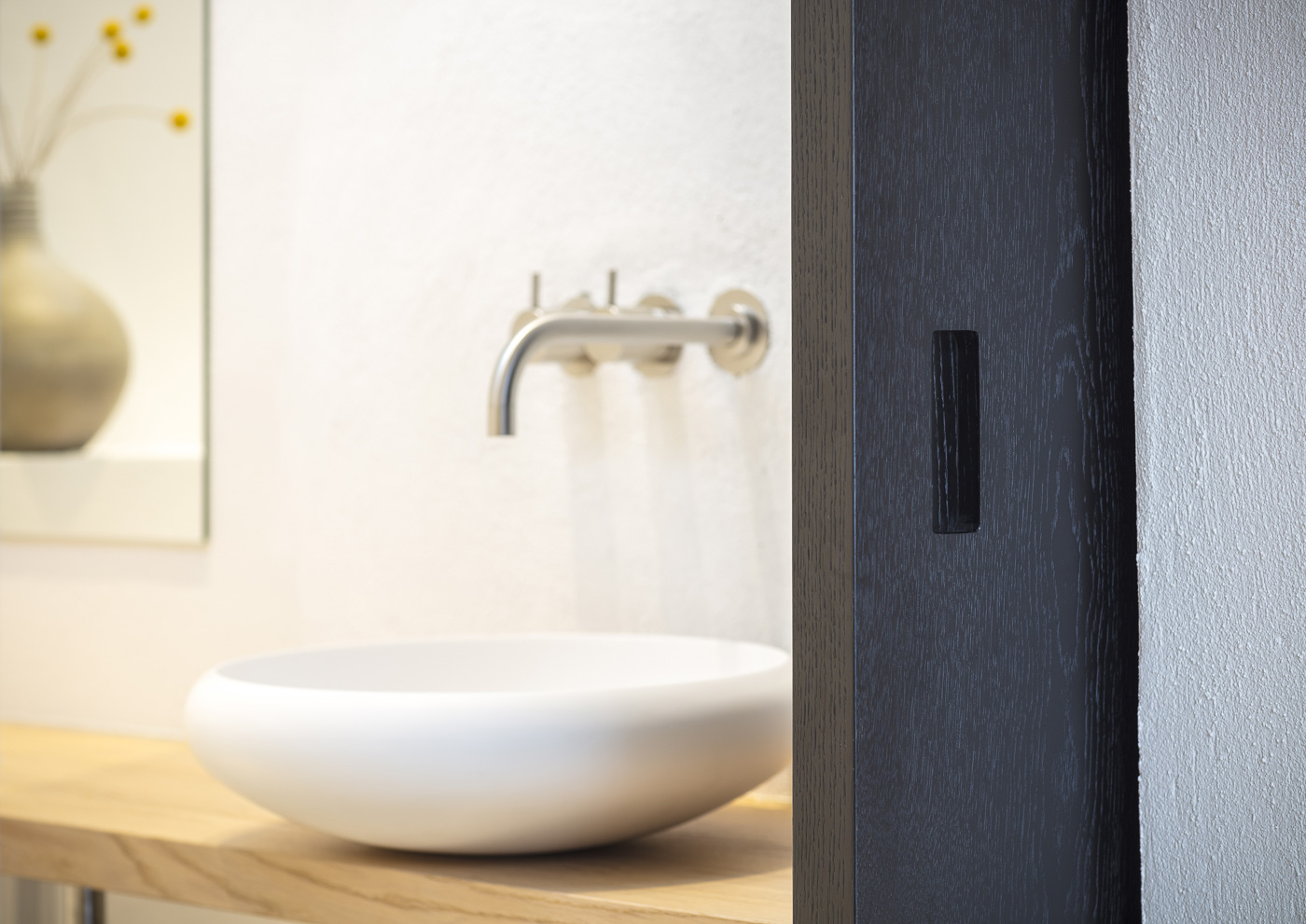
Sliding door in black stained oak creates an atmospheric contrast to the white walls.
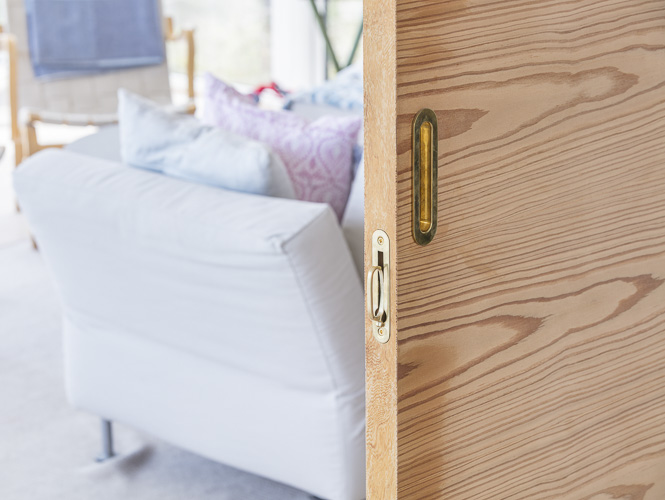
Do your interior sliding doors need to push boundaries?
Don’t hesitate to get in touch and let’s put your dreams into action together. You are always welcome to give us a call or send us an email.<
We look forward to hearing about your next project.
Contact Us Directly to Learn More!
Architect, contractor, craftsman, carpenter or owner? No matter who you are, we’re here to help, advise and guide you. Contact us at:
Get inspired by some of our projects that make use of sliding doors from Vahle
Our interior doors are available in a wide variety of designs, ranging from classic and traditional to modern. At Vahle, we want to deliver doors that play a part in the overall narrative of a room. That’s why all our sliding doors are handcrafted to perfectly match your home’s interior design and architecture. It’s one of the things that sets our doors apart from others. Here you get handcrafted quality based on the classic virtues of carpentry and an attention to detail that is clearly visible.
In our project gallery, you can see more examples of our sliding doors in use and notice how the clean lines and good wood help create an unmistakable Scandinavian touch to your home’s style.
